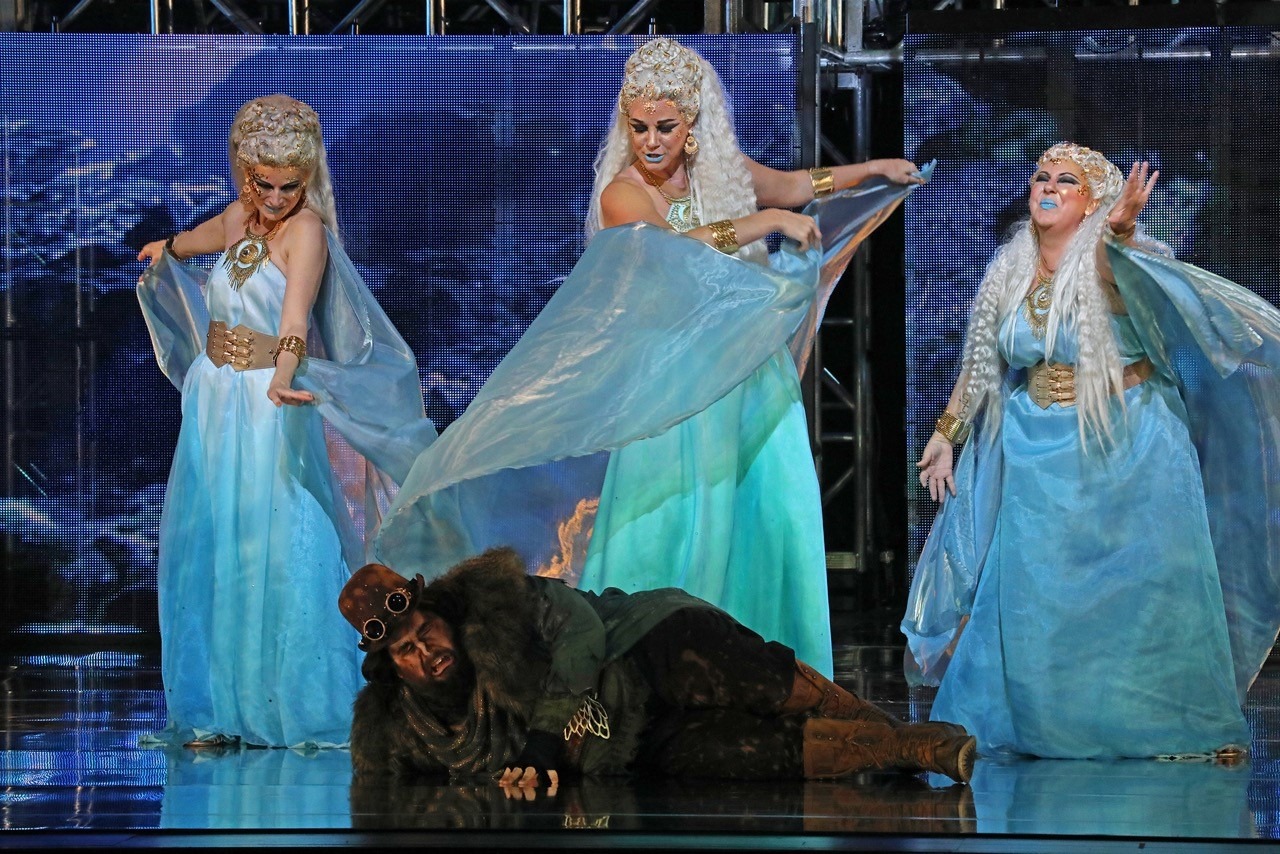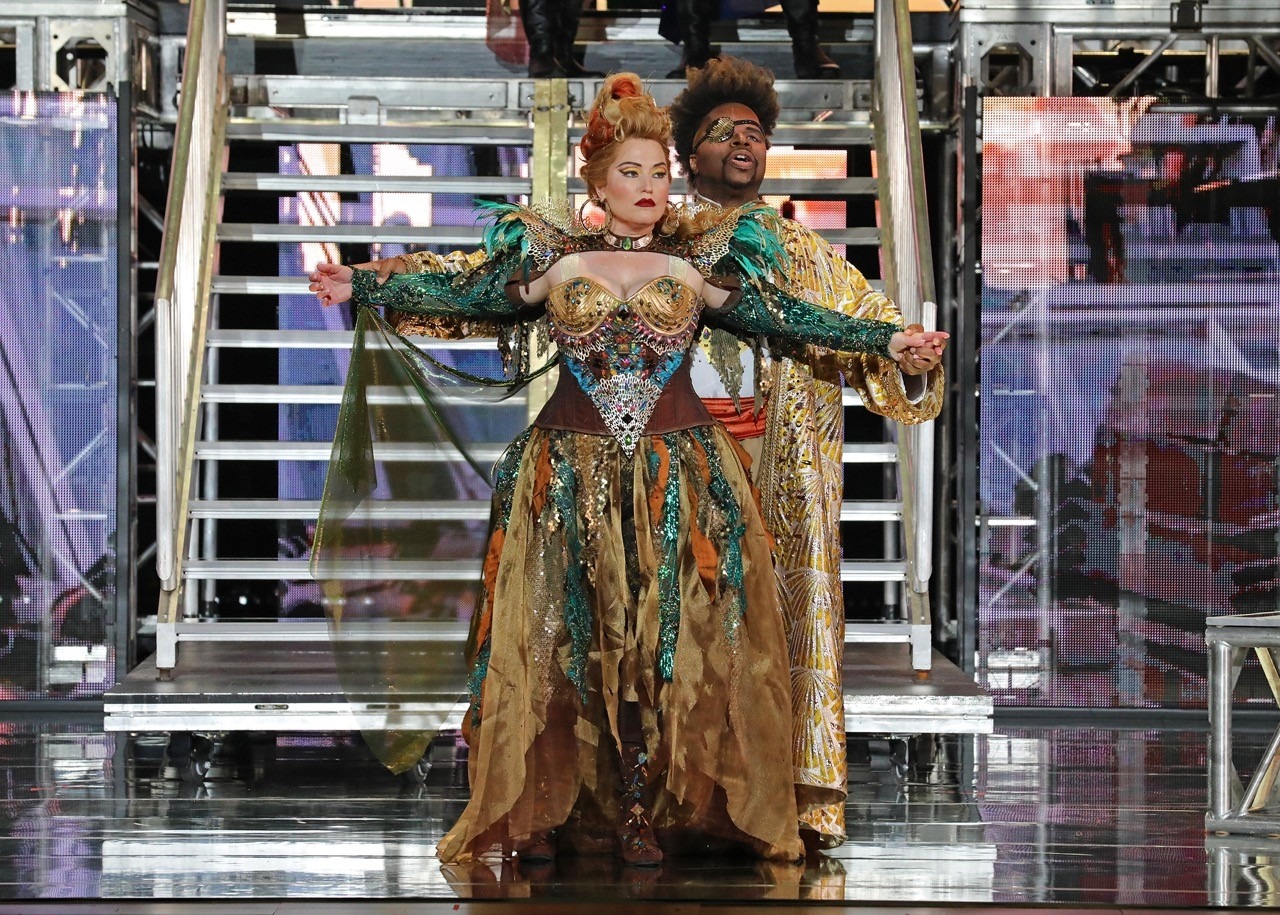Nashville Opera Presents
Das Rheingold at Belmont

On May 6th, Nashville Opera presented Richard Wagner’s epic music drama Das Rheingold in the Fisher Center for the Performing Arts at Belmont University. A not-so-humble expression of former Belmont University President Bob Fisher’s power and influence, the hall is billed as a “…state-of-the-art facility adding another diamond to Music City’s ring of world-class venues.”* It is quite a challenge that Director John Hoomes created for himself with this production, but in many ways it was quite successful.
After a failed production that left him in catastrophic debt in the Latvian (then Russian) town of Riga where he was the city’s opera director, Wagner swore to only write operas of a size and scale that would demand serious financial commitment to the production. Das Rheingold, a three-hour prelude to the great cycle Der Ring des Nibelungen, is nothing short of epic, combining and retelling variations of three old Norse and Icelandic myths from the Eddas. These are the same sources from which J.R.R. Tolkien derived his Lord of the Rings trilogy and where Stan Lee derived some of the modern superheroes that seem to be the only thing Hollywood produces anymore (Thor, Loki, etc). This music is the centerpiece of German nationalism (the Nazis loved Wagner) and requires a huge orchestra, giant, godlike voices, and a staging that would stretch the resources of any major Metropolitan company; in this, Nashville did the very best that it could.

In the famous opening scene, 100+ measures of E flat depicting the creation of the world, the “big bang” depicted on the “two story HD video wall.” It was quite fun to hear live, especially with the four Wagner tubas that were brought in from Atlanta for the performance. Throughout the orchestra played well, despite some hiccups at the onset. For example, the prelude began audibly and increased with what seemed to be terraced dynamics as opposed to a more subtle increase. I’m not sure how much of this is due to the score; Maestro Dean Williamson employed Eberhard Kloke’s version of the score with a reduced orchestra. I’ve not been able to see the arrangement, but aurally the stings were difficult to hear often during the evening, even in this ‘state of the art’ hall. Another complicating factor was the darn pandemic. It swung through music city in a vicious way the week before the production and rumor has it that it devastated the ensemble’s ranks with illness just before the production.
As the curtain went up, the Rhinemaidens, (Woglinde, Jessie Neilson; Wellgunde, Danielle MacMillan; Flosshilde, Jessie Neilson) fetching and charismatic in Rhine riverwater blue with matching lipstick, fended off and mocked the loathsome Alberich (Samuel Weiser) with glee. When the gold appeared, everything came together, and their voices blended in a fantastic, glittering delight—a delightful opening frame that returned well at the end. Alberich, with goggles and garb of a minor (perhaps?) sang in incredible voice. His attempted seduction of the maidens was less lecherous than the interpretations that I am used to, but it was a fantastic decision. It humanized him so that we felt for him when Wotan stripped him of his power, justifying to ourselves the reckoning of his terrible curse.

In the next act, we are introduced to the Gods of Valhalla, with their own incredible voices and sparkling costumes. Indeed, costume designer Matt Logan, the designer for Reba McEntire, glitterbombed the Gods with rhinestones and bright, oversaturated colors like an ‘80s era science fiction film (think Flash Gordon). I understand the urge to recognize location in operatic productions, the “mountain giants” with Tennessee beards were great, but do we have to incorporate “Nashvegas” into our high art too? Once, we were called the “Athens of the South,” now, I’m not so sure.
Lester Lynch’s Wotan was remarkable. If Weiser’s voice brought a nuance to Alberich’s character, Lynch brought power, appropriately ruling the hall. In blocking he was constantly moving around and repositioning himself, which, especially in scenes with Loge, seemed to undermine his authority in a comical way. Loge’s (Corey Bix) tenor was well refined, and his comedy hit true, garnering several chuckles from the audience. Wotan and Loge’s conflict of the giants, powerfully sung and shockingly acted at the fratricide by Ricardo Lugo (Fasold) and Mathew Burns (Fafner), “Hort, ihr Riesen!” was stirring and chilling. Ladies Freia (Othalie Graham) and Fricka (Renée Tatum) deserve special mention: Graham’s strident top effectively expressed her fear in capture and Tatum’s rich, round sound brought a warm and youthful vigor to her character’s portrayal. Erda, a strange character, was also brought out well by Gwendolyn Brown who, under Maestro Williamson’s quite slow direction, gave a portrayal that seemed to appropriately exist out of time. Finally, Donner (Joshua Jeremiah) and Froh (Tyler Nelson) were valiant, cocky, and annoying as one would expect while Mime’s bright tenor (Allan Glassman) briefly made me wish we would be watching Siegfried in a couple of days.

In the end it is difficult for me to give an overall opinion of this mixed production. The voices were of tremendous quality and showed innovative interpretations of the classic characters. The company however, seemed a little overwhelmed. As the Gods paraded their way across the rainbow bridge to Valhalla (there is a rollercoaster in Valhalla?) I wondered if Nashville Opera shouldn’t wait until they have a chance to grow a little more, get used to staging productions in the new hall and have the means to support a standing orchestra (instead of re-creating one for each production) before they reach for the sparkle of another one of Wagner’s epic music dramas. One wonders if they had used the same resources for a more manageable German Romantic work, say Weber’s Der Freischütz or Marschner’s Vampyr, one wonders what they might have accomplished. In any case, with this year’s memorable productions of Rigoletto, Favorite Son, and Das Rheingold, Nashville Opera has had a season that would be the envy of any midsize city in the South, Bravo!
*The hall is nice, but another Ryman or Schermerhorn? Nah. You should have seen the way they accosted my wife for attempting to bring a bottle of water in (as the program suggested)!




